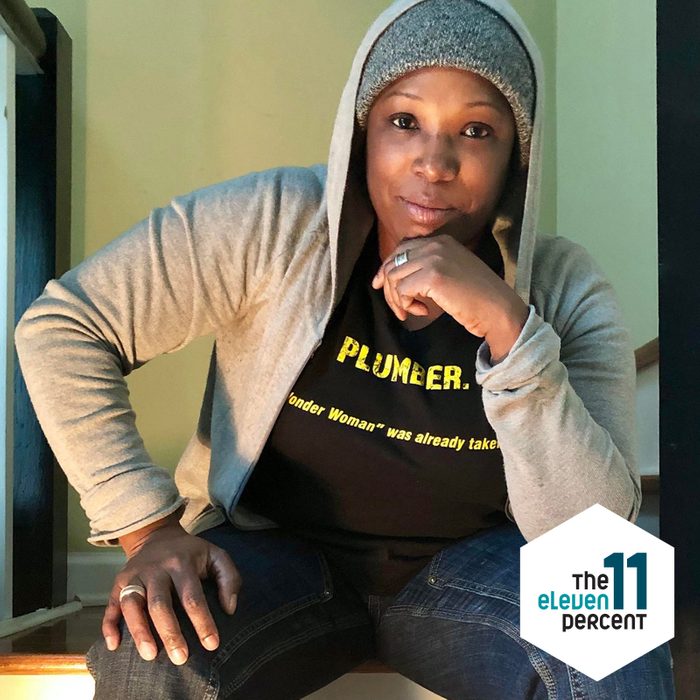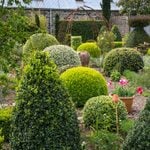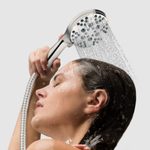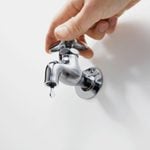The Eleven Percent: Meet Judaline Cassidy, Professional Plumber

New York City's "feminist plumber" talks about essential workers, inspiring young women to join the trades and what's in her tool bag.
Our editors and experts handpick every product we feature. We may earn a commission from your purchases.
This FH series introduces readers to just a few of the women who make up 11% of the construction workforce in the United States, spotlighting stories of their careers in the field. Know someone we should feature? Email us here.
When Judaline Cassidy set her sights on a trade-school education in her home country of Trinidad and Tobago, the not-quite-five-foot-tall young woman first had to convince the instructor she could hack it as a plumber.
“I literally dropped down and was doing push-ups and saying, ‘I got this!’ ” she says. “And that’s how I got accepted into the program.”
After school, Cassidy moved to New York City, where she worked as a nanny, housekeeper and personal shopper. Once she dug into plumbing, she quickly excelled, becoming one of the first women accepted into Plumbers Local No. 371 on Staten Island. Twenty-five years later, she is still passionate about the trade and her union while mastering her craft for the New York City Housing Authority.
Cassidy’s long list of accomplishments includes being the first woman elected to the Examining Board of Plumbers Local No. 1 in New York City. She’s received numerous accolades for her tireless activism for women in the trades, including founding Tools & Tiaras, a nonprofit that introduces girls to the construction trades.
We caught up with Cassidy for her take on the state of the plumbing industry.
Q: How has COVID affected your business?
A: From the beginning of COVID, I still had to work in people’s apartments on a daily basis. Early on, I used to go to work petrified every day and come home petrified every day. Am I making them sick, or are they making me sick?
Now, I’m not as scared as I was at the beginning of COVID. But back then, it was really scary being an essential worker. What we do as tradesmen and tradeswomen, we will always be essential. Even if people don’t say that, we still know it.
Q: Which plumbing projects stand out to you?
A: Oh yeah, a lot of them. I’ve worked on some of the most amazing buildings. Those huge high-rise buildings, that landscape of New York City, that concrete jungle, that’s me.
I’ve worked at the United Nations and at Ground Zero. I was traumatized by 9/11 and it was really hard for me to work back in the City. Working back there a year or two later gave me pride. Also, walking on 42nd Street, there are so many buildings and offices I worked on.
That’s a tradespeople thing. We get to walk by and know our hand has touched this building, and there’s a pride in knowing that. Learn about Jessie Cannizzaro, a plumbing contractor.
Q: What changes have you seen over the past 10 years?
A: It was really hard to break that wall of masculine silence when I first started. Now, men are embracing women coming into the trades. We just did our fundraiser for Tools & Tiaras. For years our number one supporters were women. This time around, the men showed up for us big time.
There are other things, too, like the plumbing calendar used to be sexy women with wrenches who clearly didn’t do plumbing. Now it’s me, someone who is sexy and also knows how to use tools. And that’s important, because if women see people who look like them doing it, they’re more likely to do it. A lot of women are capable of doing this if they’re given the opportunity.
Q: Any pros to being a woman in the plumbing trade?
A: I think just being a woman is beneficial, and I wish more women would embrace that.
Women are very meticulous, we are very neat, and we are very organized. Some women worry about not being strong enough, but not all jobs require brute strength. You can do certain things, like extending the leverage of a wrench, which will give you the edge to get the job done. I can always find ways, because the brain has a way of making things work. I like solving puzzles.
The only thing I would love about being a guy is the ability to pee easily, especially come the wintertime, when we have so many clothes on and going to the bathroom is a big hassle.
Q: Any advice for young women looking to get into plumbing?
A: Jobs don’t have genders and the trades can be your ticket from poverty to middle class. Plumbing did that for me. I grew up not loving myself, not having any self-confidence. But when I picked up a tool, it changed the way I viewed myself and how great I was. It’s empowering.
Girls need to know that they can be part of a lucrative and life-changing industry, as well as have a versatile skill that is usable anywhere in the world. With any job, the difficulty is not the actual job, it’s the politics with the people. It’s always the people. So get your superhero cape, be a warrior for the cause, have your alter ego, and know you can do this. You’ll be surprised at how amazing you are.
Q: Why are you called the “feminist plumber,” and how do colleagues react to that?
A: My friend started introducing me at events as “the feminist plumber.” Since I’m a social activist, I liked it, and added it to my bio. It sparks a lot of conversations. Women get it. And I’m so glad that the brotherhood of men is changing and getting more comfortable with women on the job.
Some men do ask, “What is a feminist plumber?” I say, “A female plumber. That’s it.” Then they get deflated. It’s like they were looking for something to battle over. I don’t know if they thought I was going to say “burn the bras,” but no, it’s not that. It’s just a cool title, so I embrace it.
Q: What are your trade-specific goals?
A: I want to be a voice for all people in the trades, so people look up to us and recognize that we’ve always been essential and will continue to be essential. It’s my mission, because I found my purpose in plumbing and in being a tradesperson.
My goal for this country is for people to really appreciate skilled workers and teach their kids that these are great jobs and the people who do them are extremely intelligent. We build the buildings that you work in, live in, and entertain in every day. Let’s make sure trades programs remain in our schools, and that they’re funded. Read about the inspiring journey of Soph Davenberry, a sheet metal worker.
Q: What are your go-to tools?
A: I don’t have a tool bag per se, but I always have on my denim. I’m a Carhartt girl. (Editor’s note: Carhartt no longer makes Cassidy’s favorite denim, but she also uses this insulated jacket.)
In my pockets are a pair of baby channel locks, a four-way screwdriver and a tape measure. That’s what I walk into each job with. Then I go get my bucket of tools, which always includes a pipe wrench. And I must have on my bandana that I wear like Axl Rose. I’m an ’80s girl. Then when winter comes, I’m in the beanie. That’s my superhero costume I wear every day.
Plumber Judaline Cassidy Bio
As a 25-year New York plumber, Judaline Cassidy has broken barriers fighting for equity for women in the male-dominated construction trades. She is one of CNN’s 2020 Champions for Change, the voice behind the trademarked phrase, “Jobs Don’t Have Genders,” the founder of the pioneering nonprofit Tools & Tiaras, a public speaker, role model and recipient of numerous awards and recognitions.
Writer Karuna Eberl Bio
Karuna Eberl is a regular contributor to FamilyHandyman.com. She has spent the last 25 years working as a freelance journalist and filmmaker, specializing in telling stories of people, nature, travel, science and history. She has won numerous awards for her writing, her Florida Keys Travel Guide and her documentary, The Guerrero Project.



